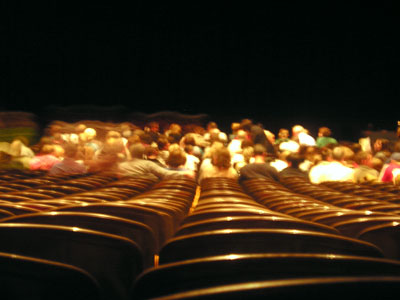All Nonfiction
- Bullying
- Books
- Academic
- Author Interviews
- Celebrity interviews
- College Articles
- College Essays
- Educator of the Year
- Heroes
- Interviews
- Memoir
- Personal Experience
- Sports
- Travel & Culture
All Opinions
- Bullying
- Current Events / Politics
- Discrimination
- Drugs / Alcohol / Smoking
- Entertainment / Celebrities
- Environment
- Love / Relationships
- Movies / Music / TV
- Pop Culture / Trends
- School / College
- Social Issues / Civics
- Spirituality / Religion
- Sports / Hobbies
All Hot Topics
- Bullying
- Community Service
- Environment
- Health
- Letters to the Editor
- Pride & Prejudice
- What Matters
- Back
Summer Guide
- Program Links
- Program Reviews
- Back
College Guide
- College Links
- College Reviews
- College Essays
- College Articles
- Back
On Theater MAG
The room is quiet. There are people sitting in seats, whispering in the dim theater. They have all agreed to join this hall of stories, this fairytale heard together.
They turn in unison. The murmurs cease, and their eyes alight upon the stage, where a single spotlight shines. It turns the curtain, once gray with shadow, into a bright velvety crimson. The curtain rises, slowly. And people, costumed, fill the stage. They are pretending, and yet telling the world’s truth, such that all in the audience are swayed at once.
They cry in unison, their tears wetting the theater floor. They laugh, and it all comes at once — a great swell of sound, deep and joyful as a choir. They sigh, groan, think and feel. They look at the characters and see a mirror to themselves, every person joined in this universal dance.
A drama is a shared reverie — a moment to understand that every person feels the same earth-quaking, song-raising emotions that we do in our quietest moments outside of the theater. Inside, we are one eye watching, one ear listening.
We are sitting in the pews, so long ago, stained glass filling the air with color as the preacher tells a tale we all understand. We are in the woods, the night quiet, the sky filled with stars (or are those spotlights, too?) and the ground cool dirt, as the firelight flickers on our faces. We listen to the storyteller. There are strong men and brave women and magic beyond belief, but it all ties back to us, ancient and unchanging.
The Greeks did it, I heard, and Shakespeare did it too, and now there is Tony Kushner and Broadway. As long as there are people, there will be stories to tell, and emotion to entrance us.
The stories never change, really. They are always the same, the tragedy and the rise, the prologue, the climax, because we are really all one person, sullen and thinking that we are alone in our thoughts. So we share how we feel in the form of fiction, again and again. And each time, the message is received and understood, the cry heard, and the joyful call rebounding.
A novel is its own world, a private place to listen. There are only two chairs, you and the author, and it is a lovely speech to warm your heart, but no one sits beside you to experience the story, too. A play is the same story, made real and visual and true, experienced with an audience. If you laugh, will they follow you? Are you all not members of a lifelong improv group?
Are the actors really acting? Or have they felt it all before? And you have, too, which is why you clap at the end. Are we really so different? No. And we never were.
I remember seeing “A Christmas Carol,” years ago, performed by a Boston troupe on a circular stage. It reminded me of a miniature amphitheater, albeit in a cramped and dark room housed in a brick building on a congested city street.
The circle is even better, for drama, than the square. In the circle, we look at the actors, but also the audience. We are together — not just watching alone, eyes glued to the front, but watching as one.
We see the performers, in their top hats and outrageous gray beards and Victorian clothing, yet still so thoroughly us that the drapery is irrelevant. Tiny Tim walks around the edge of the stage, wishing us a merry Christmas. The actor is himself, and yet he is Tiny Tim too — when they say that personality is an act, I believe it. We are actors upon a stage, making ourselves into anything we pretend to be.
The troupe seems to agree. At the play’s end, they invite the small audience to the center of the room, the stage floor. We sing a final song together, “Auld Lang Syne,” and they give us branches of holly to wave. The characters are us, and we are them. There is no difference.
Theater is a chance for us to expose the beautiful and hidden truth. We are all about the same, and therefore can all understand each other. We are characters of our own making, but we can change our act just as easily as the villain rejoins the stage as a baker in the ensemble for the finale. Nothing is set in stone. Our life is a play, us players, and we are not alone, because the ensemble is seven billion wide.

Similar Articles
JOIN THE DISCUSSION
This article has 0 comments.